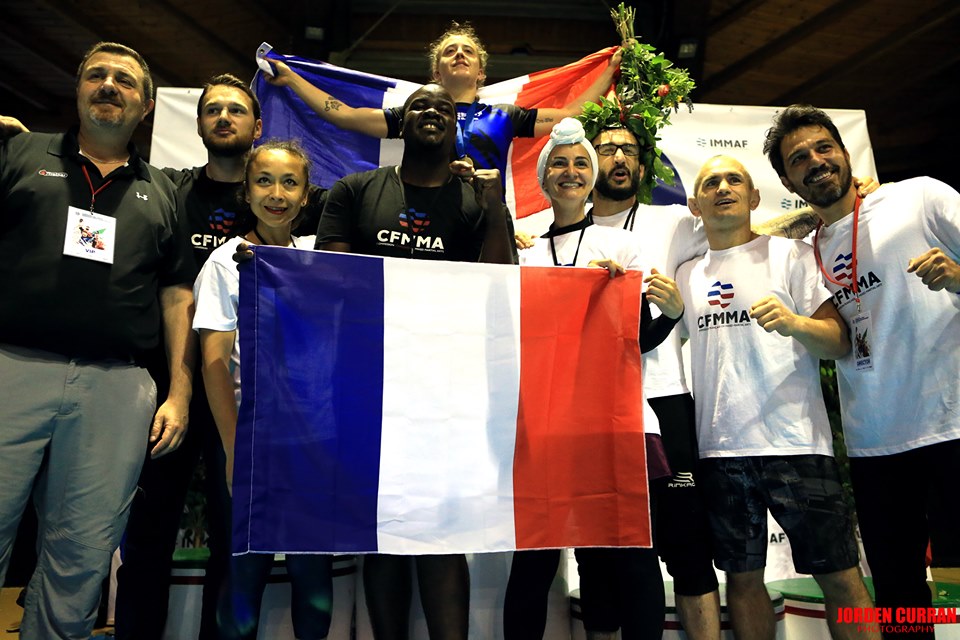The historical blockade placed upon the sport in France no doubt limited the nation’s talent development, but nevertheless, French athletes maintained relevance as successful professionals in organisations such as the UFC, and as amateur contenders on the international IMMAF – WMMAA platform.
France’s home grown and self-funded amateur talent, under the IMMAF recognized Commission Française de Mixed Martial Arts (CFMMA), did their part to see that the French Tricolour was hoisted on the podium of amateur MMA’s elite level, and succeeded in earning World and European gold medals for the nation, accomplished by the pioneering likes of Iurie Bejenari, Manon Fiorot and Axel Sola.
However, on average, the consistency and volume of France’s successes paled in comparison to its international counterparts, in nation’s that enjoyed greater acceptance and or government support and regulation of the sport. Meanwhile, team France longed for the capability to fulfill the nation’s undoubted potential.

Cue Roxana Mărăcineanu (pictured above); the former Olympic swimmer was appointed to Minister of Sport in September of 2018 and, after little more than six months, had provided the motivation and encouragement that CFMMA, team France and the world’s MMA community had craved.
“I have been to see how it is taught, and it is a sport that includes all the techniques of combat sports,” she stated in an RMC Sport interview, referring to MMA as a “complete sport”. “…We have already carried out all the necessary research.”
The following month, French athletes were back in action, at the 2019 IMMAF – WMMAA European Open Amateur Championships in Rome, Italy.
With both junior and senior European Open Championships running concurrently from 18 – 23 June, France rose to fourth place in the junior medal table, alongside the prominent Kazakh national team. With the return of 2015 world champion Iurie Bejenari now among the coaching staff, accolades were achieved by 20-year-old future prospects as Mathis Chevalier earned gold in the junior-men’s middleweight division while Asaël Adjoudj picked up bronze in the men’s lightweight bracket.
At the senior level, France claimed 5th place in the medal table, situated between hosts Italy (6th) and former championship front runners Sweden (4th). Unlike France, both Italy and Sweden already benefit from official regulation of MMA. 34 nations competed in what was the biggest European Open to date.

France’s senior level standouts included 23-year-old newcomer to the team, Begai Paulin, who earned bronze in the light-heavyweight division. Also receiving bronze was 2018 gold medalist and former World silver medalist, Axel Sola, who entered as a hot favorite in the middleweight division, but withdrew from the semi-finals due to a hand injury sustained in his quarter-final victory. The 21-year-old remains as the world’s highest ranked contender, number-one in the pound-for-pound rankings as he heads for the World Championships in November.
In the senior women’s bantamweight division, it was 27-year-old Estelle Chambeau who marched her way to a trilogy of victories, first besting Italian Elisa Patono via unanimous decision before edging a narrow split-decision win over defending champion, Sweden’s Frida Vastamaki. In the 135lb final (pictured below), Chambeau’s wrestling control was able to nullify 2018 junior world champion Megan Morris (UK), who that week transitioned to the senior ranks with surging form.

In the wake of their Sport Minister’s promise to see French MMA properly developed, the nation’s hopefuls did not disappoint. France’s athletes lived up to showing what French MMA is capable of at the international level and importantly provided a glimpse of what could be sustained and built upon in the coming years, once recognition of the sport is in full swing.
By IMMAF.org lead writer: Jorden Curran
]]>
